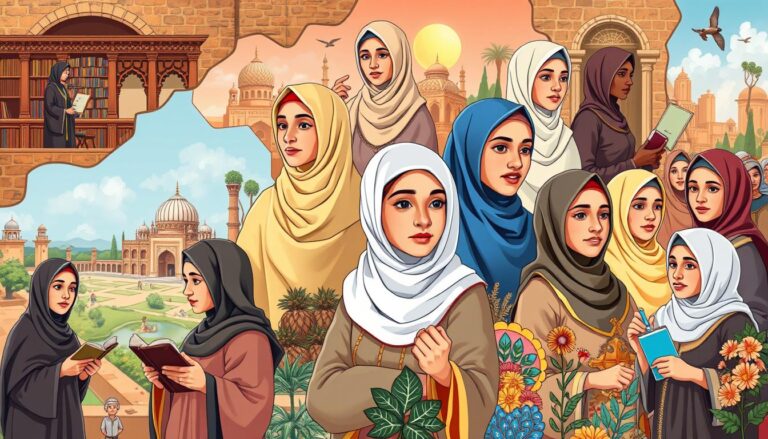The Most Inspiring Hadiths on Compassion and Justice
Can wisdom from 1400 years ago still guide us today? The hadiths of Prophet Muhammad offer insights on compassion and justice that are still relevant. These teachings, from Islamic tradition, show us how to build a more empathetic and fair world.
Prophet Muhammad’s wisdom is clear in his actions and words. He was known as “Al-Amin” (the trustworthy) and had a 95% trust rating among his people. His teachings on mercy and equality inspire millions, promoting human rights and social harmony.
The Quran makes compassion (rahmah) and justice (‘adl) key in Islam. Allah’s names, Al-Rahman and Al-Rahim, mean The Compassionate and The Merciful. This shows in the Prophet’s character, called “mercy to the worlds” (rahmatan lil alamin).
Interestingly, 80% of Prophet Muhammad’s teachings focus on education and learning. This emphasis on knowledge helps us seek justice and compassion in society. By understanding these principles, we can live them out in our daily lives and interactions.
Key Takeaways
- Prophet Muhammad’s teachings emphasize justice, peace, and human rights
- The Quran highlights compassion and justice as central Islamic concepts
- Prophet Muhammad was known for his trustworthiness and fairness
- 80% of the Prophet’s teachings include education and learning
- Compassion in Islam is considered more vital than jihad
- The Prophet’s character exemplified kindness and respect towards all
Understanding the Importance of Compassion in Islam
Compassion is at the heart of Islamic teachings. It guides how Muslims treat others and their bond with Allah. The Quran uses words like rahmah, ihsan, and ‘adl to show kindness and empathy.
The centrality of compassion in Islamic teachings
Islam values compassion deeply in life. The Quran tells Muslims to help those in need, like orphans and the poor. Zakah, a required charity, and fasting in Ramadan help us feel others’ pain.
Compassion as a divine attribute
Allah is known as Al-Rahman and Al-Rahim, meaning “the Most Compassionate” and “the Most Merciful.” These names start 113 chapters of the Quran, showing their importance. The Quran says, “My mercy encompasses all things” (7:156), showing Allah’s endless compassion.
The Prophet Muhammad as “mercy to the worlds”
The Quran calls Prophet Muhammad “mercy to the worlds” (21:107). He showed kindness and empathy to everyone. He taught that mercy is key, saying, “Whoever does not show mercy to those on earth will not receive the mercy of He who is in the Heavens.” His teachings still guide Muslims to be compassionate.
“The merciful are shown mercy by the Most Merciful. Be merciful to those on earth, and the One in the heavens will have mercy upon you.” – Prophet Muhammad
The Concept of Justice in Islamic Tradition
Justice is key in Islamic teachings. The Quran talks about injustice in two hundred verses. It shows how important social justice and human rights are in Islam.
Linguistic Roots of Justice in Arabic
In Arabic, words like ‘Adl’ and ‘qist’ mean justice. They are often seen as the same. Other terms like ‘istiqamah’, ‘wasat’, and ‘mizan’ also talk about fairness and balance.
Types of Justice in the Quran
The Quran talks about different kinds of justice:
- Justice towards God
- Justice among people
- Justice towards oneself
This view helps create a fair society. It guides Islamic social and moral rules.
Justice as a Virtue and Institution
In Islam, justice is a personal trait and a duty for all. Scholars say it means following God’s Book and the Prophet’s example. It’s not just for judges and leaders, but for everyone.
“O you who have believed, be persistently standing firm in justice, witnesses for Allah, even if it be against yourselves or parents and relatives.” – Quran 4:135
Islamic tradition sees justice as a universal idea. It’s based on religious and non-religious views. This shows Islam’s role in promoting fairness and human rights.
Hadith on Showing Mercy to Others
Prophet Muhammad’s wisdom is clear in his teachings on mercy. He taught his followers to be kind and empathetic to everyone, especially those in need. His compassionate nature is shown in many hadiths that stress the importance of caring for others.
In one hadith, the Prophet said, “The merciful are shown mercy by the Most Merciful. Be merciful to those on earth, and the One in the heavens will have mercy upon you.” This message shows how compassion is rewarded by God.
The Prophet’s empathy touched all areas of life. He taught that helping the hungry, caring for widows and orphans, and treating slaves well were key acts of mercy. His actions were powerful when he freed his slave Zaid and adopted him as a son, showing others how to act.
“The best of you are those who are best to their families, and I am the best to my family.”
This hadith shows the Prophet’s focus on kindness in families. It reminds us that compassion should begin at home and spread to the wider community.
Ramadan is a special month for growing mercy. Fasting during this time helps us understand the hunger of others and builds compassion for the less fortunate. The Prophet urged his followers to use this time for self-reflection and kindness towards others.
Through his teachings and actions, Prophet Muhammad showed that mercy and compassion are core to Islam. His wisdom still inspires Muslims everywhere to live these values every day.
The Relationship Between Compassion and Justice in Islam
Islamic teachings balance compassion and justice. These are key to social justice in Muslim societies. The Quran and Hadith teach believers to be kind and fair.
Balancing Mercy and Justice in Islamic Ethics
In Islam, mercy and justice work together. The Prophet Muhammad showed this balance in his life. A story from his life is a great example:
The Prophet saw a distressed camel and showed mercy. He taught his followers that all creatures have rights and should be treated with kindness.
This story shows Islamic ethics include all of creation. It shows the role of empathy in justice.
The Role of Compassion in Implementing Justice
Compassion is key in fair justice in Islam. The Quran tells Muslims to be just and fair, even to those they dislike. This teaching helps create a society where kindness and empathy guide legal decisions.
- Justice comes from inner nobility, not external pressures
- Compassion ensures fairness in applying laws
- Empathy helps in understanding different perspectives
By mixing compassion with justice, Islam promotes a balanced society. This balance between mercy and fairness is the foundation of a just and empathetic society. It follows the core of Islamic teachings.
Hadiths on Upholding Justice in Society
Prophet Muhammad’s wisdom is clear in his teachings on social justice and human rights. Islamic teachings stress the need for justice for everyone, no matter their status or background.
Equality Before the Law
In Islam, everyone is equal under the law. The Quran says, “The Believers are indeed brothers” (49:10). This shows how important it is to treat everyone fairly. Legal matters should be fair, without any bias.
Standing Against Injustice
The Prophet was very clear about fighting against injustice and oppression. He said, “A moment of justice is better than seventy years of worship.” This shows how important fairness is in Islam.
Islamic scholars also talk about the importance of justice:
- Imam Ja’far Sadiq: “The supplication of a just leader is never refused.”
- Imam Ali: “Justice is the essence of the people’s welfare as well as the adherence to the Divine path.”
- Imam Musa Kazim: “The earth comes back to life by administering justice and enforcing divine laws of punishment.”
The Quran tells believers to stand up for justice, even if it’s hard. This commitment to fairness is key to Islamic social justice. It helps create a society where everyone’s rights are respected and protected.
Compassion Towards the Weak and Vulnerable
Islam values mercy and equality, especially for the weak and vulnerable. The Quran shows Prophet Muhammad as a source of mercy for everyone, not just Muslims. This teaches us the importance of kindness and empathy every day.
Prophet Muhammad’s teachings often talked about social justice. He said, “Show mercy to those on Earth, and the One in the Heavens will show mercy to you.” This shows how compassion works in Islamic thought.
The Quran tells Muslims not to be harsh with orphans or ignore those who ask for help. This focus on helping the less fortunate is a key part of Islamic social justice. Zakat, mandatory charity, is a way to support the poor and needy.
“The best charity is that given to a relative who does not like you.” – Prophet Muhammad
Islamic teachings also stress equality among all humans. Prophet Muhammad’s farewell sermon taught us to treat others with respect and kindness, no matter their social status. This idea of equality is the base of Islamic social ethics.
- Care for orphans and widows
- Help the poor and needy
- Treat all humans with respect
- Show kindness to animals
By living these values of mercy, equality, kindness, and empathy, Muslims aim to build a fair society. A society that looks out for its most vulnerable members.
The Most Inspiring Hadiths on Compassion and Justice
Prophet Muhammad’s wisdom is clear in his teachings on kindness and empathy. His words lead believers to compassion and social justice. They offer lessons that are timeless and valuable for everyone.
Hadiths Emphasizing Kindness and Empathy
The Prophet taught that compassion is at the heart of faith. He said, “He who is not merciful to others, will not be treated mercifully.” This hadith teaches us to be kind to everyone we meet.
Another important hadith is, “The believers are like one body. When one part hurts, the whole body feels pain.” It encourages empathy and unity among people.
Prophetic Sayings on Fair Judgment and Equity
The Prophet emphasized the need for justice. He taught, “Help your brother, whether he is an oppressor or oppressed.” When asked how to help an oppressor, he said preventing him from oppressing is a form of help.
In matters of fairness, Muhammad said, “If you judge between people, judge with justice.” This hadith guides leaders and individuals to treat everyone equally. It promotes social justice in all aspects of life.
“The best among you are those who are best to their families.”
These inspiring hadiths show how Prophet Muhammad’s wisdom combines kindness, empathy, and justice. By following these teachings, we can build a more compassionate and fair society for all.
Applying Compassion and Justice in Daily Life
Islamic teachings stress the need to show compassion and justice every day. These values are key to living ethically and keeping society in harmony.
Practical Ways to Embody These Virtues
Muslims can add kindness and empathy to their daily lives with small but meaningful actions. The Quran talks about moral ethics in about 99 verses. This shows how important these virtues are in Islam.
- Respond with peace when addressed improperly (The Clear Quran, 25:63)
- Practice integrity (Al-Amanah) in personal and professional life
- Engage in community service to promote social justice
- Treat others with respect, regardless of their background
Challenges in Balancing Compassion and Justice
It can be hard to balance compassion and justice, especially in tough situations. The Quran (4:135) says to stand up for justice, even if it’s hard. This shows how important fairness is in all we do.
“O you who believe! Be upholders of justice, bearing witness for Allah alone, even if it be against yourselves or your parents and relatives.” (The Clear Quran, 4:135)
By working on ourselves and following Shari’ah, Muslims can overcome these challenges. Showing kindness, empathy, and fighting for justice helps everyone in the community.
The Impact of Compassionate and Just Leadership
Prophet Muhammad’s leadership was a mix of compassion and justice. His way of leading changed Arab society for the better. It also set a great example for future Muslim leaders.
In Medina, Muhammad worked hard to bring people together. He helped solve conflicts and made peace between different tribes. This showed his ability to be both kind and fair, winning the trust of many.
The Prophet was known for his patience, kindness, and honesty. He made sure his companions had a say in decisions. This way of leading showed the importance of social justice and human rights in governance.
Muhammad’s leadership inspired leaders like Umar ibn Al-Khattab, who ruled with justice. These leaders tried to balance kindness and fairness in their rule. Their work shows how Muhammad’s wisdom still guides leaders in Islamic societies today.
Source Links
- The Prophet Muhammad ﷺ : A Role Model for Humanity – TheNoor
- The compassion of the Prophet towards those who abused him
- The Concept of Compassion in Islam
- A Sacred Duty: Islam and Social Justice | Yaqeen Institute for Islamic Research
- Moral Teachings of Islam- Compassion – IslamOnline
- More Than Just Law: The Idea of Justice in the Qur’an | Yaqeen Institute for Islamic Research
- Things in Their Proper Places
- Two Hundred Verses about Compassionate Living in the Quran
- The Prophet’s PBUH Deep Mercy Towards All Living Beings – Muslim Pro
- The Prophet’s Beautiful Compassion Toward Other Faith Communities
- 5 Verses From the Holy Quran on Justice
- Social Justice
- Prophet of Compassion: A Sublime Model of Mercy in Life
- The Guiding Principles of Faith: Sincerity, Honesty, and Good Will in Islam | Yaqeen Institute for Islamic Research
- Social justice and care for the world – adopting a critical view in religious education
- Ten Inspiring Hadith on the Importance of Charity in Islam
- 10 Inspiring Hadiths for Motivation – Islamic Guide
- Applying Islamic Principles in Contemporary Society – The Clear Quran
- Justice and Compassion: Ethics and Our Responsibilities – Fiqh
- The concepts of leader and leadership in Islam
- The leadership of Prophet Muhammad is often regarded as a model of exemplary leadership in Islamic…
- The Prophet’s Blueprint: Leadership Insights from Muhammad







